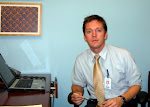 Scabies in an immunocompromised baby.
Scabies in an immunocompromised baby.There is an interesting article in this week’s New York Times, titled “
The Price of Beauty: For Top Medical Students, an Attractive Field .
Yesterday, I think, was the day when medical students here in the USA matched into residency positions for specialty training.
The article summarizes the efforts of two Harvard medical students to match in a dermatology residency. It outlines their background, the reasons for their wanting to enter the field, etc.
The article points out that of late an increasing number of the medical students with the highest scores and honors are becoming dermatologists and plastic surgeons. One excerpt reads, “The vogue for such specialties is part of a migration of a top tier of American medical students from branches of health care that manage major diseases toward specialties that improve the lives of patients…”,
Of course, most all disease is major when examined from the perspective of the diseased, and life improvement is undeniably good. Surviving and surviving well is and will forever remain a most worthy goal, and helping others do so a most worthy cause.
It follows that dermatology, like all fields in medicine, offers real opportunity to help sick people and is therefore a great line of work.
In the article, one of the soon-to-be dermatologists was not so eager to generalize “The No. 1 thing that is going to save your life is the humdrum preventative stuff like blood pressure and cholesterol,” he said, “But there is not a lot of respect for doctors who do that because anyone can get into it. But if you are an expert where no one else is, like the eye or the skin, your input is valued.
Hmmm.
“Humdrum preventative stuff”? What an unfortunate quote. Is dermatology somehow less preventative (cancer?) or repetitious (acne?) than general medicine? I never thought so.
The idea that “there is not a lot of respect for doctors who do [the stuff]” makes me wince. Is not every cure necessitated by a missed opportunity at prevention? Personally, I prefer low cholesterol to bypass surgery.
As for the assertion that, “Anyone can get into [the stuff]”, I would point out that there are several kind, smart folks in the world that want to be doctors but cannot.
Until recently, I worked as a pediatric HIV doctor in Swaziland. There are many “major diseases” there. There is no medical school in the country, and, before 2006, there was not one public sector pediatrician. To put it simply, Swazi children suffer and die all the time for lack of access to medical doctors and medical care.
Their travails do not stop there. Swazi children have little or no access to public schooling, and most children of the Swazi countryside will never learn to read. Medical school, I would say, is quite out of the question.
I wish this were not true, because there are entirely too few doctors (of any specialty) in Africa. Almost all of the health care professionals working there are undertrained, underpaid, and overworked. They fight hard and their patients die anyway so they often burn out early and sometimes, by no fault of their own, find it more and more difficult to care.
The organization with which I work—the Baylor International Pediatric AIDS Initiative—is doing its part to help address this workforce crisis. BIPAI is placing doctors on the ground and is heavily invested in training health professionals around Africa Wherever possible, BIPAI focuses on task shifting. In other words, it is part of my job to help ensure that general nurses and other health professionals learn to do as much of what I do as possible. Pediatric HIV care, while complicated, does not require an MD. I can only hope that some day I will wake up to find my skills commonplace and my role in Africa obsolete. This would mean healthier kids.
Unfortunately, the day when I am to wake up and find myself not needed is far away.
In any case, I am proud that it is my job to help prevent and (if unable to prevent) treat all-too-common illnesses. I am equally proud to help others learn and take over my job.
I am not quoting the medical student in the NYT story to pick on him. I am certain that he is well-meaning. I do not blame him for seeking respect, for it goes without saying that everyone seeks a modicum of some third party’s esteem. Even respect for respect’s sake is no doubt an attractive indulgence. (As is money.)
I just wanted to point out two things that I think all aspiring doctors should know:
(1) Remuneration and perceptions of prestige aside, every job has an element of the humdrum. One must find something that he or she can do ten thousand times and still find meaningful.
(2) Not everybody gets to be a doctor…or a nurse…or a public health specialist…or a community health worker. For those that do, the health profession is a unique and monumental opportunity.
So, as long as my blood pressure and cholesterol allow my heart to keep beating and my skin protects me from the elements, I will do my best not to thwart this opportunity.
Despite the tone and questionable content of the article, I hope that the brightest American medical students will do the same.



